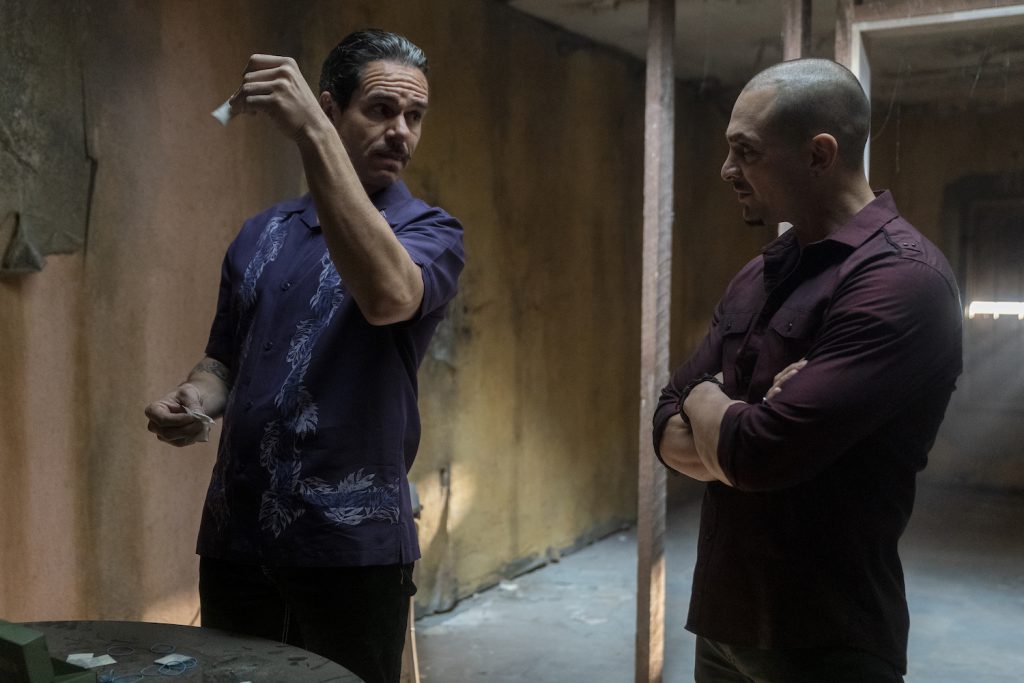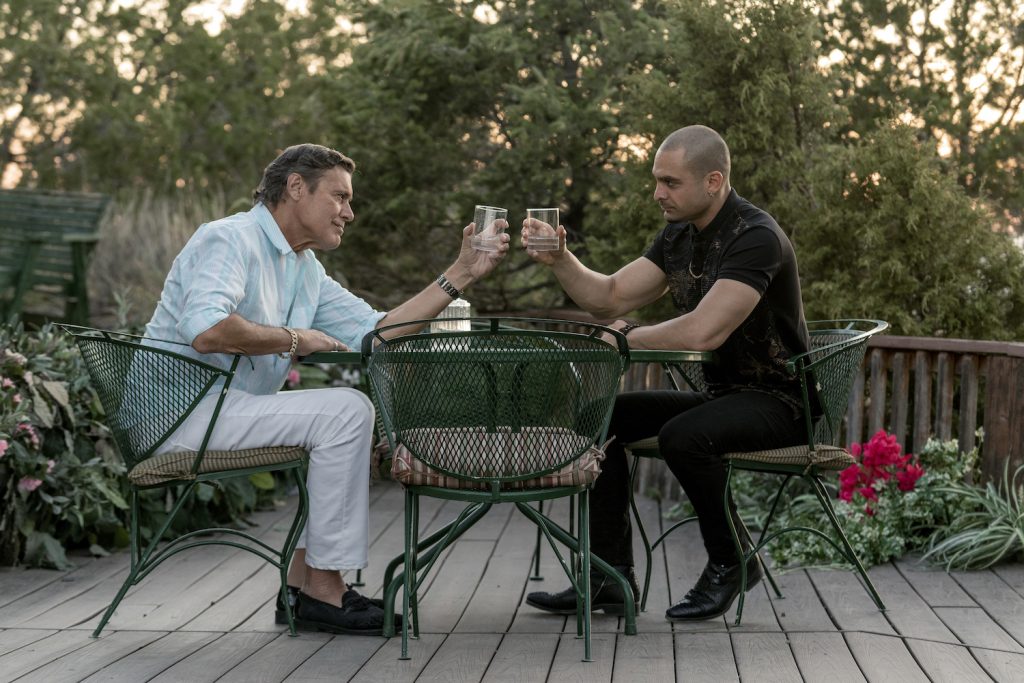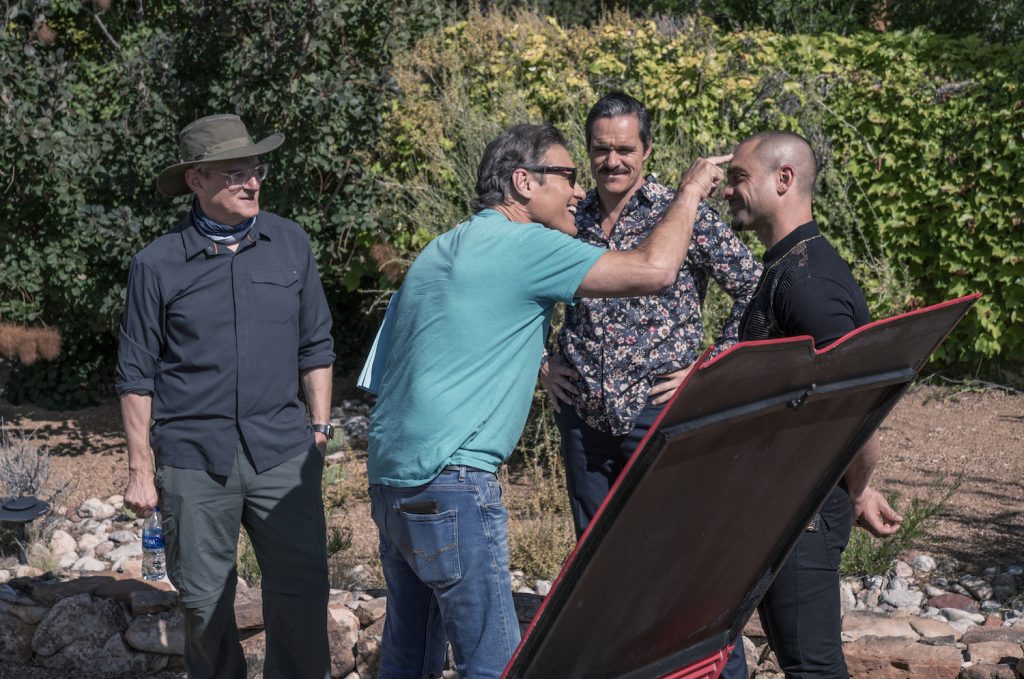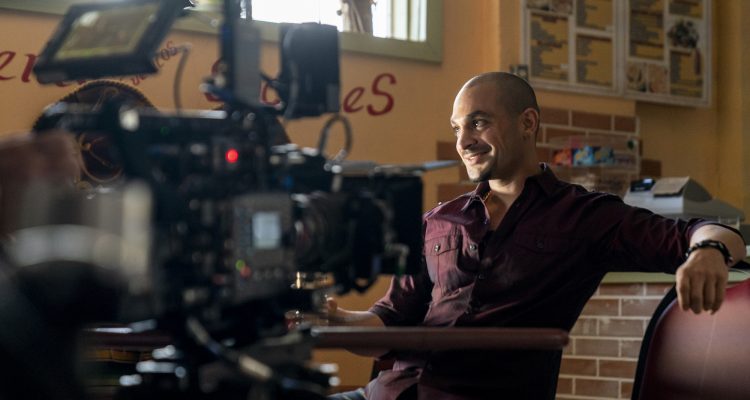In season five of Better Call Saul, Michael Mando has once again raised the bar with his performance as Nacho Varga, the conflicted cartel associate who’s doing all he can to keep his father alive.
Working under the Salamanca family umbrella while spying for Gus Fring has pushed the character to the brink, allowing Mando to showcase his incredible range as a performer while giving this season its most heartfelt storyline.
“What I love about the character is the dichotomy of the violence that is in his life now and the purity that he has in his heart,” Mando shares. “It’s very much instilled from his early years with his father.”
Mando’s onscreen relationship with his father took on a new meaning when he learned that his real life father had stage four cancer. Mando gives an incredibly honest account of working through that difficult period, his father’s recent passing, and how one cast member reached out with an incredible message.
Awards Focus was honored to close Better Call Saul week with this incredibly insightful and generous conversation with Michael Mando.
Awards Focus: In Breaking Bad, the character of Jesse Pinkman (Aaron Paul) was originally set to leave the series after only a few episodes. The writers changed their minds on Pinkman’s arc, allowing him to be one of the few surviving characters in the series.
When you got the role of Ignacio “Nacho” Varga, what was the initial pitch for the character and how did it evolve over season one?
Michael Mando: When I first got the role, Nacho was set up as an antagonist to Jimmy McGill (Bob Odenkirk). When we were shooting the scene in the desert with Tuco Salamanca (Raymond Cruz), I was told I was going to do some very bad things at the end of season one.
I think they quickly realized that Jimmy’s relationship with Chuck McGill (Michael McKean) had more tension and animosity, and that he would be the better antagonist for the early seasons. Ultimately, that pushed Nacho to the periphery of the show and allowed the writers to create a longer, almost curveball arc to the character.
Without that choice to focus on Chuck, we would never have found the humanity and complexity of Nacho. He’s a character that’s driven by the love of his father and is trying to do the right thing, which is far from is original arc of a gangster arc of trying to reach the top of the food chain. Now, he’s desperately trying to get out.
AF: Nacho’s father, Manuel Varga (Juan Carlos Cantu), always holds a mirror up to Nacho and reminds him of his better angels. Particularly, when he shows up at Nacho’s house and finds the women, drugs, and amenities you’d expect from a successful cartel associate. You play that with such honesty, and traces of shame, but also capture the fact that Nacho is trying to hide those feelings from his father. It’s so beautiful, can you talk about that?
Mando: What I love about the character is the dichotomy of the violence that is in his life now and the purity that he has in his heart… very much instilled from his early years with his father. Those two opposite forces are really what tears Nacho apart, and in his father’s eyes he find the genuine love that he’s always wanted. Like Ulysses, it’s a journey back home and the home in this case is a state of mind for Nacho.
AF: Can you talk about the arc of Nacho and Lalo Salamanca (Tony Dalton), and how you build that relationship as actors and characters?
Mando: I’ve played a lot of guest spots in my career, and that can be difficult when you come onto a show. As a series regular on Better Call Saul, I wanted to correct the hardships that I felt as an upcoming actor. When Tony joined us in season four, I really wanted to welcome him as much as I could and invite him into my home and make sure he didn’t feel like the new guy.
We developed a really beautiful friendship over the last two years and that played out in our scenes together. Our characters are total opposites in a lot of ways, but they do have each other’s respect.

(Photo Credit: Warrick Page/AMC/Sony Pictures Television)
AF: Can you delve into the tug of war Nacho that finds himself in this season between the warring drug factions?
Mando: Nacho is certainly caught in the middle of a war. He’s got the Salamancas, whose code is “By any means necessary,” and everyone else is expendable. They’ve threatened Mike Ehrmantraut’s family, they’ll do whatever it takes to meet their goals.
On the other side, there’s Gus Fring who has somewhat of a morality, but he’s using an innocent man, Nacho’s father, to leverage Nacho into spying on the Salamancas.
The only character that has the balance that Nacho is seeking is Mike Ehrmantraut. He’s the only character that has a universal code of ethics, not in a legal sense, but more akin to Marcus Aurelius.
AF: When Mike goes to bat for Nacho with Gus, it really spoke to Mike’s code of ethics as you point out. What’s it been like working opposite Jonathan Banks and getting to know him?
Mando: Well, my father passed away four days ago from cancer, which is one of the reasons I came back to Canada. I found out he had stage four cancer while filming season five, and that made playing Nacho’s storyline very difficult.
In many ways, my father on the show and Mike Ehrmantraut are very much the same person in terms of their inner strength and beliefs, and my real father and Jonathan Banks were good friends. Jonthan has been a big brother to me, both through the example he sets and his encouragement.
Two days ago, he called me to share his condolences and gave me some of the best advice I’ve ever gotten. He said, “Everybody knows you’re really talented, but I don’t think you believe that. Until you believe it, down deep in your core, you won’t be able to sleep. You can get all the praise and win all the awards, but you’ll never ever enjoy. Don’t wait until you’re seventy to accept that and start enjoying the experience now.”
AF: I’m glad that you have people like that in your life, it’s a testament to your personal character as much as it is your talent.
Mando: Thank you so much.
AF: I’d like to touch on how Nacho is often placed in very intense scenes with life and death stakes. Swapping out Hector Salamanca’s (Mark Margolis) medication was especially stressful for viewers, and that dread is instilled in us from your performance.
Can you talk about your process as an actor when you’re shooting the pill swap? And how does it feel knowing Nacho had a hand in putting Hector in the famous dinging bell wheelchair?
Mando: I have such respect for Mark Margolis and his work on both series. I learn so much from my directors and fellow actors… I always put myself in a position of humility to be open to what they can give me in a scene. When I’m shooting a scene with high stakes, my focus is on the character’s vulnerability and the vulnerability of the moment.
A trap for a lot of actors is when you play the end result… knowing that your character is going to succeed in his or her task and letting that seep into your performance. In real life, you’re always doubting and fearing that you’ll fail, so it’s my job to portray that earnestly.
Nacho doesn’t consider the paralysis of Hector to be heroic, it was purely the risk he had to take to defend his father. Hector wanted to involve him in the cartel’s business and Nacho knew that his father wouldn’t allow it and they’d kill him.
That moment for Nacho was one of love and sacrifice, knowing that he could be tortured or dismembered, or killed in the most brutal way. Nacho’s father is the beacon of purity for him, almost a saint figure, and he’ll do whatever he has to to protect him.
AF: Nacho is doing his best to get away from the business but every choice seems to complicate his predicament. Gus’ discovery of the pill swap is what lands Nacho in his current predicament of indefinite spying on the Salamancas.
Mando: It’s interesting because it seems like all the characters on the show are mover deeper toward the dark, but Nacho is just trying to embrace the light and escape the dark. In many ways, he’s like Mike’s son who is a Serpico figure who wanted to call out the police department for corruption and got killed.
AF: Can you talk about your early days in theater and how you’ve adapted from that language driven medium to a character like Nacho who has to convey so much with his expressions?
Mando: I come from a classical theater background and I’ve been fortunate to play a lot of iconic Shakespearian characters. Those roles have so much dialogue and there’s a real emphasis on blocking, physical movement, and utilizing your voice.
With Nacho, he’s a taxing character because you have to go deeper inwards to, using elements from your personal life, and finding things on the day that inspire you. Vince Gilligan mentioned Seven Samurai to me and that Nacho was like a Black Samurai that has no master. He’s being pulled into a war he wants no part of, but he has no choice.
AF: Can you give us some examples of on set inspiration, some moments that weren’t scripted that made it into the show?
Mando: There’s the scene where the cops are about to raid a Salamanca drug house, and Nacho decides to run into danger and grab the drugs before the cops break in and catch him. It was a big risk, but Nacho took the chance to earn Lalo’s respect.
In the script, Nacho was supposed to get back in the car and that was it, but I decided to pull out the drugs and some them to Lalo… like how a cat hunts down a mouse and then puts it on the owner’s doorstep.
AF: That’s fascinating, I love that analogy. Can you name a few other instances of inspiration that altered scenes?
Mando: When Nacho’s father visits his apartment, there were several moments that we found on the day. Juan Carlos, who plays my father, he and I look at this giant absurd painting in the apartment and it became this moment where Nacho realizes how far he’s come from being his father’s son.
Also, one of the girls that’s living with Nacho left her panties on the counter, and I grab them and hand them to her and she shoves it into the drawer with the utensils. Those were little inspired things we did, but it doesn’t compare to the text which is so rich. Our writers are really unbelievable.
AF: Outside of improvising physical actions, have there been instances where the approach to the dialogue evolved as you rehearsed?
Mando: There’s a really beautiful scene between Nacho and Mike this year, and when we first read it aloud it was very confrontational. Jonathan and I were literally yelling at each other.
Then he and I went into a corner worked on the scene while the crew set up the lighting and we found a real humanity in the material. We could lower our weapons and take off the armor for a moment, and it became a very honest conversation… I really loved the end result.
AF: Can you talk about Nacho’s trip to Mexico and his meeting with Don Eladio (Steven Bauer)? There’s a real confidence that Nacho brings to that meeting when they’re one on one.
Mando: Steven Bauer was such a kind actor and we hit it off right from the start. I remember getting a call from him at two in the morning the night before we shot our scene. He said, “Hey man I’m at the hotel bar, where are you at?”
We had a great chemistry and I remember on set, Steven told Peter Gould that he felt Nacho would be the son that Don Eladio never had. He really felt that Don Eladio wasn’t putting on a show when he spoke with Nacho, he was being himself.


(Photo Credit: Greg Lewis/AMC/Sony Pictures Television)
AF: In the finale, it seems that Lalo realizes Nacho betrayed him. What do you foresee for Nacho in season six, knowing that he’s last favor with Lalo but has good favor with Don Eladio?
Mando: At the end of that season, Nacho has become his own man. He’s got to face Lalo now, and Don Eladio, and face Gus. He has to figure out if Mike will be on his side. He’s really in a unique spot next season where everyone wants a piece of him.
AF: I want to close with your single “The Wild One.” It’s a really powerful track and draws from your life, can you talk about the inspiration there and your history with songwriting?
Mando: Music has always been an outlet for me for self-expression and getting these emotions out. I’ve written so many songs over the years, it’s definitely therapy for me. When my father had the cancer diagnosis, it led me to the feeling that I should release this thing that I’ve been doing for so long in private.
My fear was that I wouldn’t release music until my father died, and he would never hear me in that way. I’m grateful to have “The Wild One” out and there’s a lyric that says, “My father’s eyes cry in grievance.” I hope people find that it speaks to empowering you in moments of grief and sadness.


